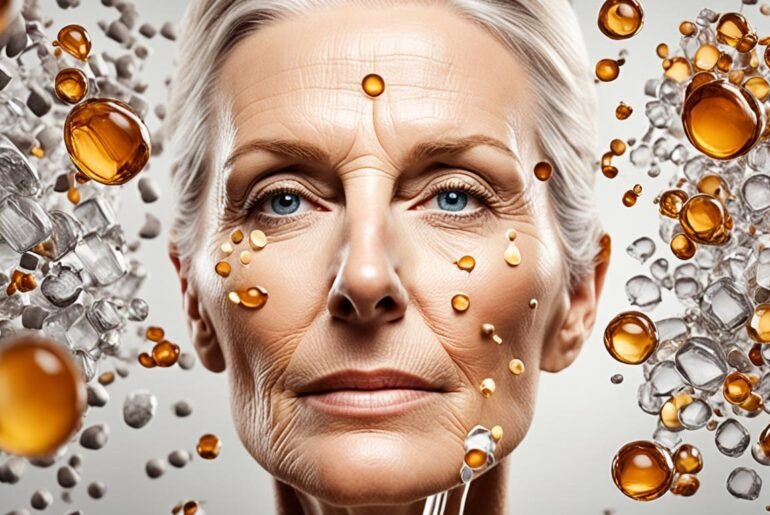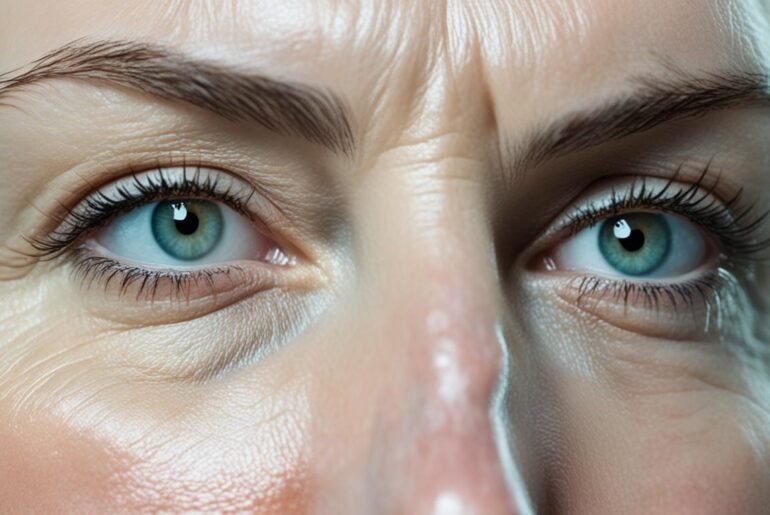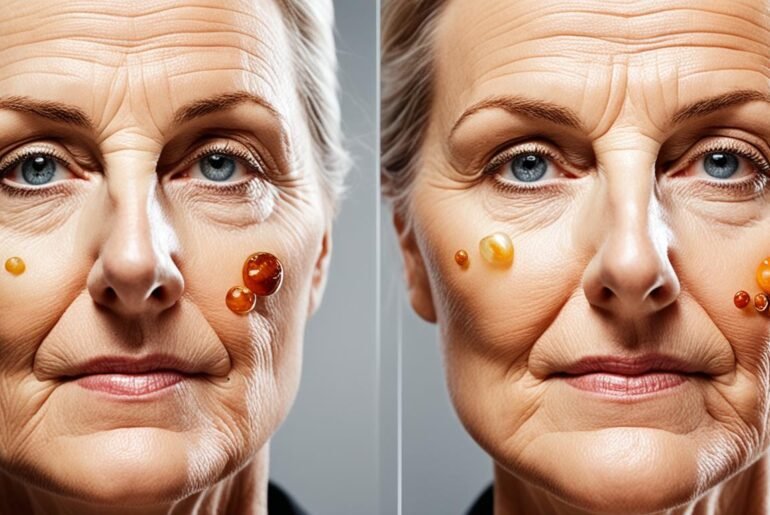Did you know that frequent and excessive drinking can have a significant impact on your skin health? Alcohol, a commonly consumed beverage, can cause a range of skin problems, from dehydration and reduced elasticity to worsening underlying skin conditions. The effects of alcohol on the skin go beyond just temporary flushing or puffiness – they can have long-term consequences.
In this article, we will explore the various ways in which alcohol affects your skin and discuss the potential damage it can cause. From dryness and dullness to increased risk of skin infections and even skin cancer, alcohol’s influence on your skin health is worth understanding.
Key Takeaways:
- Alcohol is a diuretic, causing dehydration and dryness of the skin.
- Flushing, a common side effect of alcohol, occurs due to the release of histamines.
- Sleep disruption caused by alcohol can lead to darker circles under the eyes and a dull complexion.
- Alcohol consumption can worsen skin conditions like rosacea, psoriasis, and eczema.
- Preventive measures, skincare routines, and professional treatments can help minimize and repair skin damage caused by alcohol consumption.
Effects of Alcohol on Skin Health
Alcohol and its impact on skin health are closely intertwined. The negative effects of alcohol on the skin are numerous, ranging from dehydration to inflammation. When we consume alcohol, our bodies produce a toxic byproduct called acetaldehyde. This byproduct has a drying effect on the skin, leaving it feeling dry and lacking moisture.
Furthermore, alcohol acts as a diuretic, causing moisture loss and affecting the outer protective layers of the skin. This can lead to dryness, decreased elasticity, and compromised skin barrier function.
Another consequence of alcohol consumption is inflammation, which can manifest in various skin health concerns. Common issues associated with alcohol consumption include:
- Dark circles under the eyes
- Puffiness
- Flushing
- Red nose
- Slower cell turnover
- Photosensitivity
- Increased risk of skin conditions like rosacea and psoriasis
- Accelerated skin aging
- Heightened risk of skin cancer
Understanding how alcohol affects the skin is crucial in order to address these concerns and maintain skin health. By minimizing alcohol consumption and adopting a proper skincare routine, individuals can mitigate the negative effects and promote healthier skin.
Skin Concerns Related to Alcohol Consumption
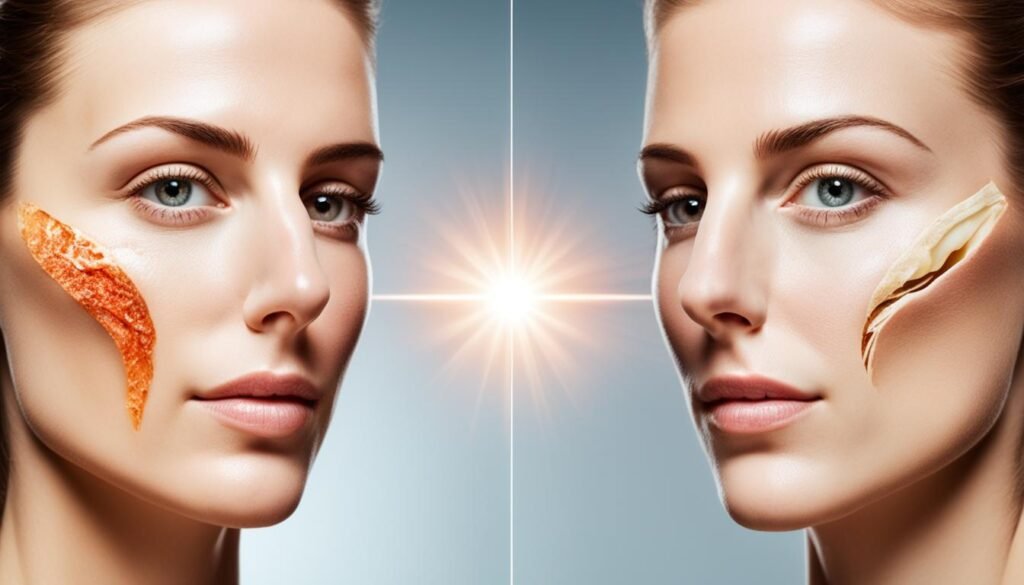
Alcohol consumption can have various negative effects on the skin, exacerbating existing skin conditions and causing new concerns to arise.
“Alcohol can worsen rosacea symptoms, leading to redness, dilated blood vessels, small red bumps, and pus-filled spots.”
Rosacea, a chronic skin condition, is particularly susceptible to the negative impact of alcohol. The consumption of alcohol can trigger redness and inflammation, leading to the dilation of blood vessels, the appearance of small red bumps, and the development of pus-filled spots.
Additionally, alcohol can cause broken blood vessels, resulting in redness and a bloated appearance in the face. This can be particularly noticeable around the nose area.
Alcohol’s dehydrating effects can also wreak havoc on the skin, leading to dryness, wrinkles, and dullness. Dry skin is more prone to problems such as psoriasis, acne, and dandruff, which can be exacerbated by alcohol consumption.
The diuretic effect of alcohol causes the body to lose essential vitamins and nutrients, including vitamin A, which plays a vital role in maintaining healthy skin.
Furthermore, alcohol can manifest in outward signs such as bloodshot eyes, dry and thinning hair, and an unpleasant smell on the breath, sweat, and urine.
Skin Concerns Related to Alcohol Consumption
| Skin Concerns | Effects |
|---|---|
| Rosacea | – Increased redness and inflammation – Dilated blood vessels – Small red bumps and pus-filled spots |
| Broken blood vessels | – Redness in the face – Bloating |
| Dry skin | – Wrinkles and fine lines – Dull complexion |
| Psoriasis, acne, and dandruff | – Flare-ups and increased severity |
| Vitamin deficiency | – Loss of essential nutrients for skin health |
It is important to be mindful of these skin concerns and take steps to minimize the negative effects of alcohol on the skin.
Next, we will explore methods for preventing and repairing skin damage caused by alcohol consumption.
Preventing Skin Damage from Alcohol
When it comes to alcohol consumption, there are measures you can take to minimize the damage it can cause to your skin. By adopting these preventive measures, you can protect your skin from the negative effects of alcohol and maintain a healthier complexion.
- Hydration is Key: Alternating alcoholic beverages with water can help you stay hydrated and counteract the dehydrating effects of alcohol. Aim for a one-to-one ratio to ensure proper hydration and reduce the adverse effects of drinking.
- Eat a Balanced Meal: Consuming a full meal before or while drinking allows alcohol to metabolize with the food, decreasing its impact on your skin. This can help minimize dehydration and other potential damages.
- Choose Clear Spirits: Opting for clear spirits like vodka or gin over beer and dark liquors can minimize the negative impact on your skin. Clear spirits tend to have fewer additives and colorants, reducing the likelihood of skin irritation and inflammation.
- Rest and Elevate: Getting enough sleep and sleeping with your head slightly propped up can promote healthy skin cell turnover and minimize fluid accumulation in your face, reducing puffiness and swelling.
- Moisturize with Care: Select lightweight cosmetic products that provide adequate moisturization for your skin. These products can help keep your skin hydrated while also masking any redness or flushing caused by alcohol consumption.
- Stay Active: Regular exercise improves blood flow, which aids your body in removing toxins from the skin. Incorporating physical activity into your routine can support overall skin health and minimize the negative effects of alcohol.
- Limit Alcohol Consumption: The best way to prevent skin damage from alcohol is to limit your alcohol consumption. Giving your skin and body ample time to heal and renew, especially as you age, can have significant long-term benefits.
By following these preventive measures, you can safeguard your skin from alcohol’s detrimental impact and maintain a healthier complexion. Remember, every step you take to protect your skin contributes to its overall health and beauty.
Repairing Skin Damage from Alcohol
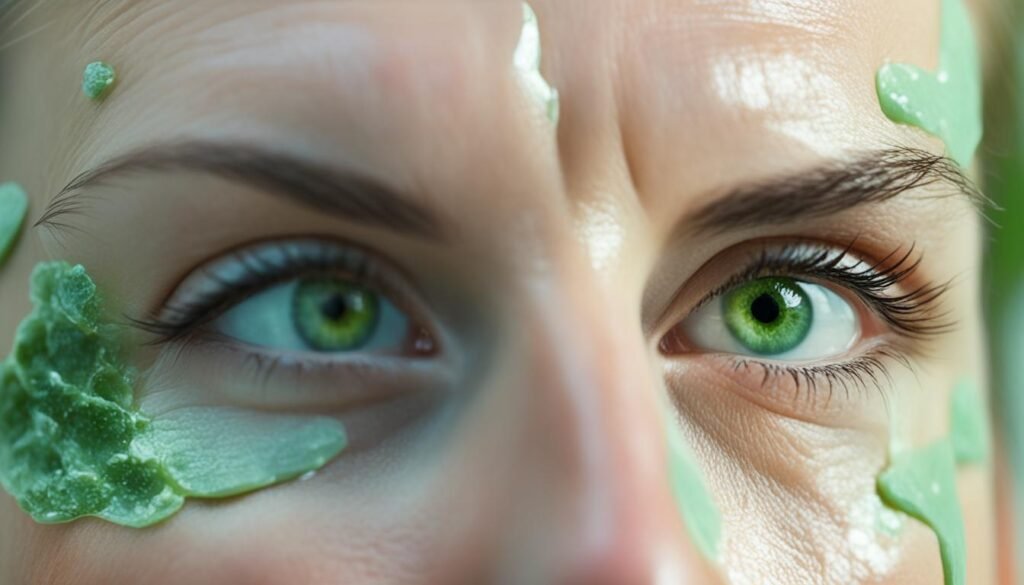
Proper skincare is crucial for repairing skin damage caused by alcohol consumption. After indulging in alcoholic beverages, it is essential to prioritize a skincare routine that focuses on rehydration and reducing inflammation. Here are some key steps to repair and rejuvenate your skin after alcohol consumption:
Cleanse and Hydrate
Start by removing all makeup and thoroughly cleansing your face. This allows your skin to breathe and promotes better absorption of skincare products. After cleansing, apply a rich, deep-hydrating moisturizer to replenish lost moisture and restore the skin’s natural barrier. Additionally, don’t forget to use an eye cream to reduce puffiness and hydrate the delicate under-eye area.
Drink Plenty of Water
Alcohol is known to dehydrate the body, which can leave your skin dull and dry. To counteract the dehydrating effects of alcohol, make sure to drink plenty of water in the days following alcohol consumption. Staying well-hydrated helps to rehydrate your skin from within and improves its overall health and appearance.
Moisturize Day and Night
Consistency is key when it comes to moisturizing your skin after alcohol consumption. Make it a habit to apply moisturizer and eye cream in the morning and evening to keep your skin hydrated throughout the day. If you notice any persistent dryness or dullness, consider using a heavier moisturizer during the day to provide extra hydration.
Treat Chronic Skin Conditions Promptly
If you have existing skin conditions that are aggravated by alcohol consumption, such as rosacea or psoriasis, it is essential to seek prompt treatment. Consult a dermatologist who can provide specific recommendations and customized treatments to address your unique skin concerns.
Quote:
“Repairing skin damage caused by alcohol requires a comprehensive skincare routine that focuses on hydration and nourishment. By following proper cleansing and moisturizing practices and seeking prompt treatment for skin conditions, you can repair and restore your skin’s health and vitality.” – Dermatologist Jane Smith
Skin Repair Tips After Alcohol Consumption:
- Remove makeup and cleanse your face thoroughly.
- Apply a rich, deep-hydrating moisturizer and eye cream.
- Stay well-hydrated by drinking plenty of water.
- Moisturize your skin in the morning and evening.
- Consider using a heavier moisturizer if needed.
- Seek prompt treatment for chronic skin conditions.
| Skincare Products | Benefits |
|---|---|
| Hydrating Moisturizer | Restores moisture and nourishes the skin. |
| Eye Cream | Reduces puffiness and hydrates the delicate under-eye area. |
| Heavy Moisturizer | Provides extra hydration for dry and dull skin. |
Professional Dermatology Treatments
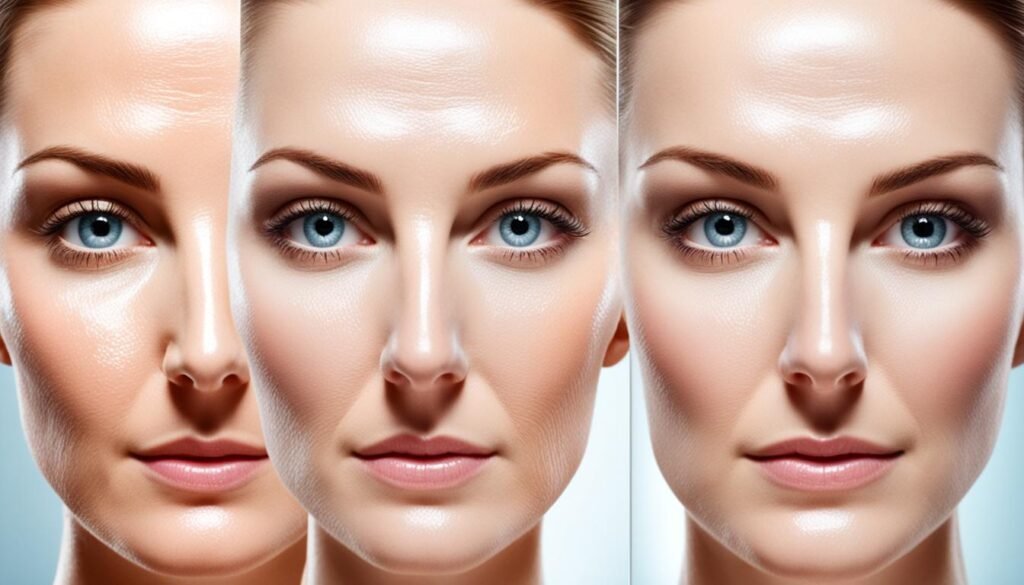
Dermatology treatments play a crucial role in addressing and repairing skin damage caused by alcohol consumption. These treatments, offered by experienced dermatologists, aim to improve overall skin health and vitality. By targeting specific concerns related to alcohol-related skin damage, dermatology procedures can help individuals restore their skin’s natural balance.
One effective treatment option is chemical peels, which involve the application of a chemical solution to the skin. This solution removes damaged outer layers, revealing fresher and healthier skin underneath. Chemical peels can improve skin texture, reduce signs of aging, and minimize the appearance of scars and pigmentation caused by alcohol-related skin damage.
Another popular treatment is facials, which offer various benefits for skin rejuvenation. Facials typically involve cleansing, exfoliation, and moisturization, tailored to address specific skin concerns. Regular facials can help improve skin tone, texture, and overall complexion, supporting the healing process from alcohol-related skin damage.
It’s important to note that each individual may have unique skincare needs and concerns. That’s why consulting with a dermatologist is essential to create an at-home skincare routine specifically tailored to address alcohol-related skin damage. A dermatologist can assess the individual’s skin condition, recommend appropriate treatments, and provide guidance on skincare products suitable for their needs.
Seeking Help and Support
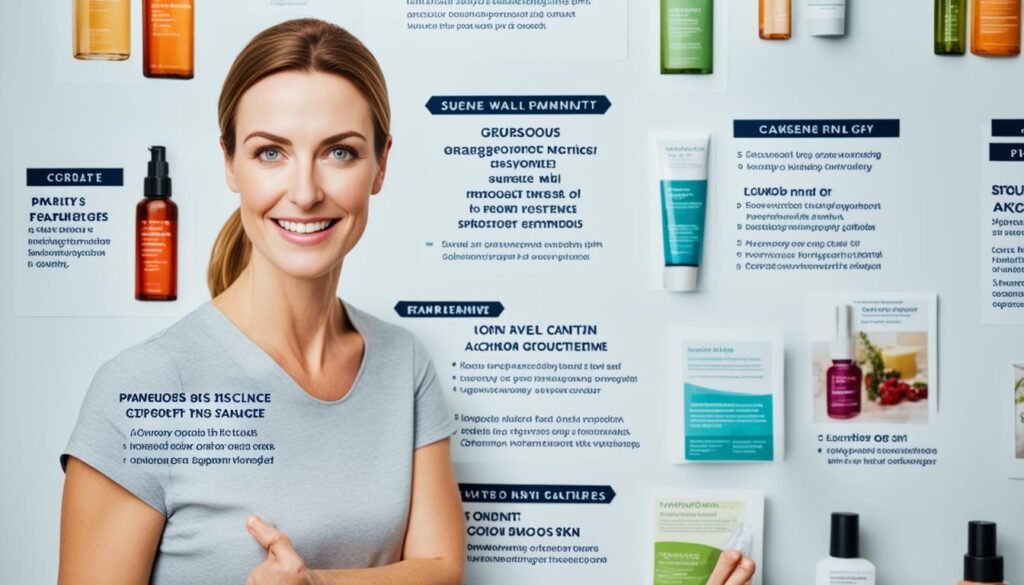
If you or someone you know is struggling with alcohol consumption and needs assistance, seeking help and support is paramount. Taking the first step towards recovery requires courage and a willingness to ask for help. There are various resources available to provide guidance, support, and practical solutions for quitting alcohol and addressing alcohol-related skin concerns.
Medical Professionals and Trusted Individuals
Initiating a conversation with a doctor or healthcare professional can be essential in addressing alcohol-related issues. Their expertise and guidance can help assess the severity of alcohol consumption, provide personalized advice, and recommend appropriate treatment options. Trusted friends, family members, or support groups can also offer emotional support and valuable insights, as they may have experienced similar challenges and have firsthand knowledge of potential solutions.
Apps and Online Resources
Several mobile applications are available to support individuals in their journey to quit alcohol. These apps offer features such as tracking progress, providing motivational messages, connecting with support communities, and accessing educational resources. Utilizing these digital tools can enhance accountability and serve as a constant source of encouragement and guidance.
Treatment Options
For individuals struggling with alcohol use disorder (AUD), various treatment approaches can be effective in achieving sobriety and addressing alcohol-related skin concerns. Cognitive-behavioral therapy (CBT), detoxification programs, inpatient or outpatient rehabilitation centers, peer support groups like Alcoholics Anonymous (AA), and medications prescribed by healthcare professionals are the most common methods employed in treating AUD. Consulting with a medical expert can help determine the most suitable treatment plan based on individual circumstances.
Managing Skin Conditions
Individuals dealing with alcohol-related skin concerns should seek ongoing treatment and maintain regular communication with a dermatologist or skin specialist. These professionals can provide tailored guidance and recommend skincare routines, medications, or other interventions to help manage and prevent flare-ups of skin conditions caused or exacerbated by alcohol consumption.
“Recovery from alcohol-related issues might be challenging, but with the right support, it is possible to achieve a healthier, alcohol-free lifestyle.”
Remember, seeking help and support is never a sign of weakness, but a testament to your strength and commitment to self-improvement. By reaching out for assistance, you can navigate the path to recovery with the guidance, resources, and understanding of others who have traveled a similar journey.
Maintaining Skin Health and Awareness
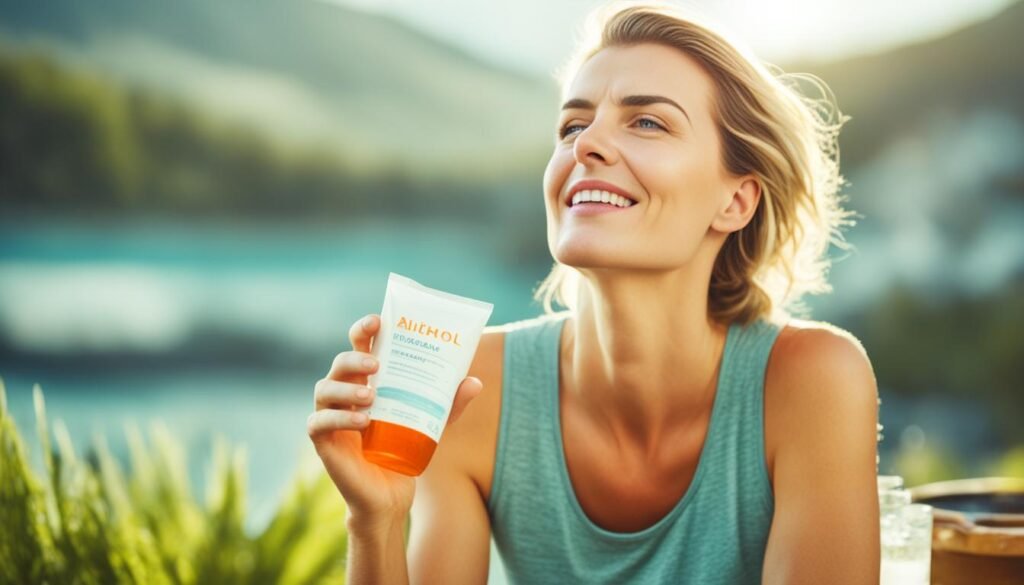
To maintain skin health and prevent alcohol-related skin concerns, it is important to prioritize a consistent skincare routine. This includes proper cleansing and moisturization to keep the skin hydrated and nourished.
Additionally, adopting a balanced diet can significantly contribute to overall skin health. Consuming a variety of fruits, vegetables, whole grains, and lean proteins provides essential nutrients that promote a healthy complexion.
Regular exercise also plays a vital role in maintaining skin health. Physical activity improves blood circulation, delivering oxygen and nutrients to the skin, while helping to flush out toxins.
Getting adequate rest is crucial for skin health as well. Sufficient sleep allows the body to repair and regenerate skin cells, leading to a revitalized and refreshed appearance.
An essential aspect of skin health is protecting it from sun exposure. Using a broad-spectrum sunscreen with an appropriate SPF and seeking shade during peak sun hours can minimize the risk of sunburn, premature aging, and skin damage.
Regular self-examinations of the skin are highly recommended to detect any changes or abnormalities. Being aware of these changes can help identify potential skin concerns early on and seek professional guidance if needed.
Skincare Tips:
- Cleanse: Use a gentle cleanser to remove impurities without stripping the skin of its natural oils.
- Moisturize: Apply a moisturizer suitable for your skin type to keep it hydrated and supple.
- Protect: Wear sunscreen with at least SPF 30 daily and reapply every two hours when exposed to the sun.
- Stay Hydrated: Drink plenty of water to help maintain skin hydration from within.
- Eat Nutrient-rich Foods: Incorporate foods rich in antioxidants, vitamins, and minerals into your diet for healthy skin.
- Manage Stress: Practice stress-reducing techniques such as meditation or engaging in activities you enjoy to promote healthy skin.
- Avoid Smoking: Smoking damages the skin’s collagen and elastin, leading to premature aging.
- Consult a Dermatologist: If you have specific skin concerns or need personalized advice, seek guidance from a dermatologist.
By understanding the impact of alcohol on the skin and implementing these skincare tips, individuals can maintain skin health and take proactive measures to prioritize their overall well-being.
| Quick Skincare Tips for Maintaining Skin Health | Importance |
|---|---|
| Cleanse the skin daily | Removes dirt, oil, and impurities that can clog pores and lead to skin issues |
| Moisturize regularly | Keeps the skin hydrated, preventing dryness and maintaining a youthful appearance |
| Apply sunscreen | Protects against harmful UV radiation, reducing the risk of sunburn and skin damage |
| Stay hydrated | Drinking enough water helps maintain the skin’s natural moisture balance |
| Eat a balanced diet | Nourishes the skin with essential nutrients for optimal health and radiance |
| Manage stress | Stress can trigger skin issues, so finding healthy ways to manage stress is important |
| Avoid smoking | Smoking accelerates skin aging and causes wrinkles and other skin problems |
| Consult a dermatologist | Expert guidance can address specific skin concerns and provide personalized recommendations |
Conclusion
In conclusion, alcohol consumption can have detrimental effects on skin health. The dehydrating and inflammatory properties of alcohol can lead to dryness, reduced elasticity, and the exacerbation of underlying skin conditions such as rosacea and psoriasis. Additionally, excessive drinking increases the risk of skin infections, skin cancer, and premature aging.
To minimize skin damage, it is important to adopt preventive measures such as staying hydrated, eating before or during drinking, and opting for clear spirits. Adequate rest, the use of moisturizing products, and regular exercise also play a key role in maintaining skin health.
When skin damage occurs, proper skincare and hydration are crucial for repair. Consultation with a dermatologist can provide valuable insights and recommendations on professional treatments. Seeking support for alcohol-related concerns and managing underlying skin conditions are essential for long-term skin health.
By understanding the effects of alcohol on the skin and taking proactive measures, individuals can prioritize their skin health and reduce the negative impact of alcohol consumption.
FAQ
What are the effects of alcohol on skin health?
Alcohol can have negative effects on the skin, including dehydration, inflammation, skin conditions, premature aging, and an increased risk of skin cancer.
How does alcohol impact the skin?
Alcohol acts as a diuretic, leading to dehydration and affecting the outer protective layers of the skin. It also causes inflammation, resulting in various skin health concerns.
Skin concerns associated with alcohol consumption include dark circles, puffiness, flushing, red nose, slower cell turnover, photosensitivity, flare-ups in skin conditions like rosacea and psoriasis, skin aging, and an increased risk of skin cancer.
How can I prevent skin damage from alcohol?
To minimize skin damage from alcohol, it is recommended to stay hydrated by alternating alcoholic beverages with water, eating a full meal before or while drinking, choosing clear spirits over additives-heavy drinks, getting enough rest, and wearing moisturizing products.
How can I repair skin damage from alcohol?
To repair skin damage from alcohol, it is important to remove makeup, apply a rich moisturizer and eye cream, drink plenty of water, and consult with a dermatologist for specific recommendations.
Professional dermatology treatments such as chemical peels, facials, and other cosmetic procedures can improve skin health and repair damage caused by alcohol consumption.
If you are concerned about your alcohol consumption or have trouble managing it, you can seek help and support from a doctor, trusted friends or family members, support groups, or alcohol quitting apps. Treatment for alcohol use disorder may involve therapy, detox, rehabilitation, peer support groups, or medications.
How can I maintain skin health and awareness while consuming alcohol?
To maintain skin health while consuming alcohol, it is important to prioritize skincare routines, including proper cleansing and moisturization, maintain a balanced diet, engage in regular exercise, get adequate rest, protect the skin from sun exposure, and perform regular self-examinations of the skin.
What is the impact of alcohol on skin health?
Frequent and excessive alcohol consumption can lead to several problems with the skin, including flushing, reduced elasticity, dryness, worsened underlying skin conditions, and an increased risk of skin infections, skin cancer, and changes in the skin due to alcoholic liver disease.


